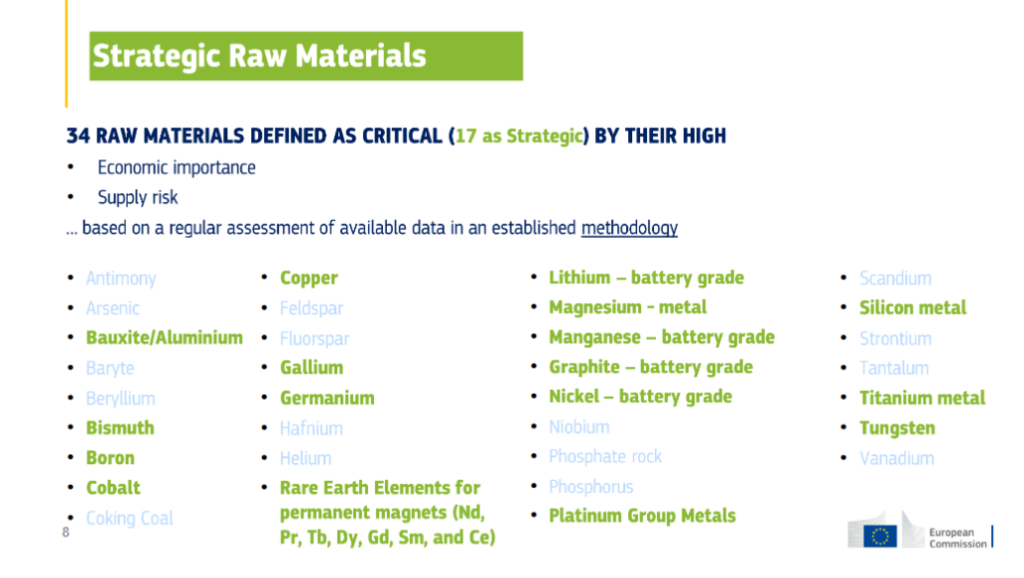Critical Raw Materials (CRMs) are indispensable for achieving the twin transition – the seamless integration of digital innovation with the steadfast pursuit of environmental sustainability. The EU economy and various strategic sectors, such as renewable energy, digital, space and defence heavily rely on CRMs. This need is confronted with a growing global demand, particularly driven by the decarbonisation of economies.
In May 2024, the Critical Raw Materials Act (CRM Act) will come into force, aligning with the Green Deal Industrial Plan and the Commission’s proposal for a Net Zero Industry Act. The latter aims to scale up the manufacturing of key carbon-neutral technologies, ensuring a secure, sustainable and competitive supply chain for clean energy to meet the EU’s 2030 climate and energy ambitions. The CRM Act, a focal point of the recent EIT Raw Materials Summit, aims to ease administrative processes and streamline permitting procedures for CRM projects in the EU while maintaining high social and environmental protection standards.
Strategic Cooperation with the Western Balkans for a Sustainable CRM Value Chain
In April 2024, the Western Balkans 6 Chamber Investment Forum (WB6 CIF) and the EC Directorates General for Neighbourhood and Enlargement Negotiations (DG NEAR) and for the Internal Market, Industry, Entrepreneurship and SMEs (DG GROW) hosted an online workshop dedicated to Critical Raw Materials in the Western Balkans. The workshop provided an overview of the EU raw materials policy, including the aims and pillars of the CRM Act and explored the strategic importance of CRMs and partnership opportunities with the Western Balkans.
Currently, 34 raw materials are defined as critical, with the CRM Act focusing on 17 strategic raw materials.

Source: DG GROW
The CRM Act’s four main pillars are:
- Strengthening all stages of the European CRM value chain.
- Improving EU capacity to monitor and mitigate risks of CRM supply disruption.
- Diversifying EU CRM imports to reduce strategic dependencies.
- Improving CRM circularity and sustainability.
Diversifying CRM imports is crucial to reduce strategic dependencies, therefore a partnership between the EU and the Western Balkans is of key importance. The CRM Acts puts forward several benchmarks, saying that not more than 65 per cent of the EU’s annual consumption of each strategic raw material should come from one single country. Currently, this is not the case, prompting the EU to forge new strategic partnerships to provide the necessary supplies, particularly within Europe. For more information on CRM in the EU, refer to this study published by DG GROW.
The Western Balkans have a high potential to establish a sustainable supply chain in rare earth metals and critical goods. Strengthening cooperation between the Western Balkans and EU Member States aims to establish a complete value chain, aligning with the EU’s commitment to integrating the Western Balkans into the European Single Market. Securing a sustainable supply of raw materials is one of the seven priority actions of the New Growth Plan.
Regional Center for Raw Materials in the Western Balkans (Albania)
On 23 April 2024, EIT RawMaterials, in collaboration with the Ministry of Infrastructure and Energy of Albania, announced the establishment of a Regional Innovation Center in Elbasan, Albania. This Center aims to be a hub for innovation, education, and business development within the raw materials domain, modernising the sector and introducing sustainable practices to drive regional growth.
Funding Opportunities
Horizon Europe, the EU research and innovation framework programme for 2021-2027 offers calls in Advanced Rar Materials, in particular under Cluster 4 (Digital, Industry and Space) and Cluster 5 (Climate, Energy and Mobility). See the following calls for example:
- Call for Proposals: Synergy with National and Regional Initiatives in Europe on Innovative Materials
- Call for Proposals: Post-Li-ion technologies and relevant manufacturing techniques for mobility applications (Generation 5)
- Call for Proposals: Sustainable High-throughput Production Processes for Stable Lithium Metal Anodes for Next Generation Batteries
EIT RawMaterials offers a Booster Call for start-ups, scale-ups, or SMEs providing sustainable solutions for the raw materials sector (deadline: 27 May). Additionally, DG GROW is opening a Call for Strategic Projects under the CRM Act to fund strategic projects along the supply chain for the 17 strategic raw materials. On 30 April, the Commission held an information day for potential applicants, and the recording and slides are also available.
All stakeholders are committed to developing projects that meet strict Environmental, Social and Governance (ESG) standards, underscoring the strategic importance of investing in the CRM value chain for partner countries, including the Western Balkans region.
POLICY ANSWERS Webinar and Report on the Green Transition
POLICY ANSWERS is preparing a comprehensive report on green transition activities in the Western Balkans. Stay updated on the region’s progress by following the WB Info Hub, as the report will be published soon. Watch again the latest POLICY ANSWERS Webinar on The Western Balkans on their Pathway to implement the Green Agenda. Join us on 27 May 2024 for the fourth webinar on Mission-oriented Innovation: Status and Future Opportunities for the Western Balkans.
________________________________
To find all the information relevant to the Green Transition theme, visit the WB Info Hub´s dedicated subpage. If you wish to share any information related to the Western Balkans region, contact us via info@westernbalkans-infohub.eu and we will be happy to spread the word through our channels.

